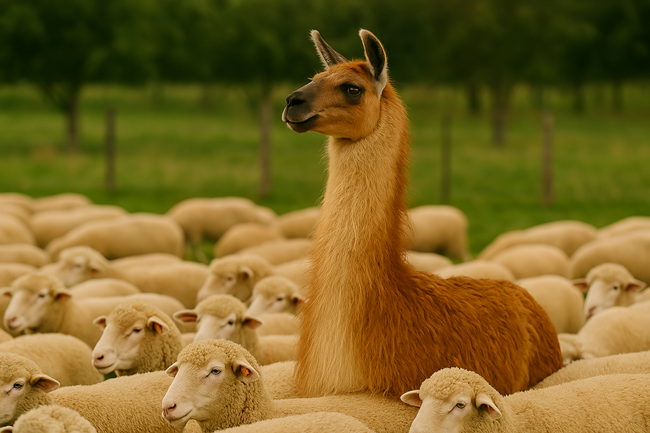
If you want to raise chickens or sheep, or another type of livestock, but are worried that you won’t be able to keep them secure, llamas might be the perfect solution to your problem. If you are unfamiliar with llamas, this might stretch your imagination, but if you have at least one acre of grass for grazing, using a llama as a guard animal can make a lot of sense.
Llamas will guard hens and lambs from foxes, coyotes, dogs and have even bears. Llamas and their smaller cousins, alpacas are members of the camel family and originate from South America. The alpaca is bred primarily for its fleece which grows continually and requires annual shearing. Although alpacas they also have guarding instincts, due to their size they are not generally as well suited to the job as llamas. The llama can be kept out all year, in all types of weather, with only the need for a simple field shelter or natural shelter from trees to offer some protection from very wet or very hot weather. About an acre of land in addition to the land required by the stock to be guarded will support a llama.
They are hardy and generally healthy, needing only the same vaccinations as goats and sheep, and they eat less when compared to their body weight than a sheep. Although generally ‘pet’ llamas should be kept in groups of at least two, the guardian llama works alone, being brought up to consider the hens, sheep, or other animals in his field to be his ‘herd’. The guardian llama is a gelded male, which has been raised properly with other llamas, and has been taught to be friendly yet respectful towards people and other livestock including familiar dogs. He will keep his charges together and keep them in sight, and, if a predator such as a fox or an unknown dog, come onto his territory he will approach with his head held low to the ground, gathering speed as he approaches. This is usually enough to send the predator packing, but if the llama gets close enough, they will also strike with their front legs, and are capable of unique growling and gurgling noises.
Related Articles & Free Email Newsletter Sign Up
Alpaca Mummies Tell of Lost Fortune
Guidelines for Raising & Training Camelids


Comment here